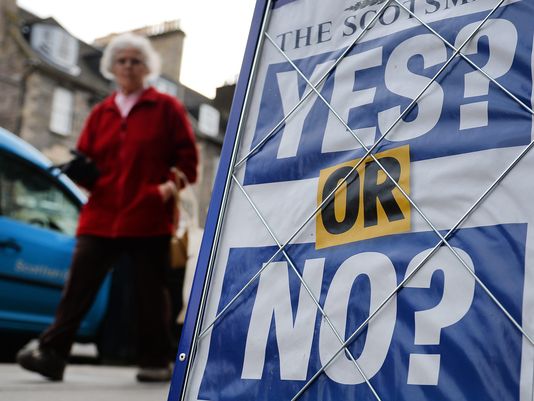LONDON — The speeches have been made, the analysis papers written and debated, and both sides have stumped their hearts out. Now it’s time for Scotland to decide.
Voters Thursday will choose whether Scotland continues its union with England that has endured more than 300 years or forge into full independence, becoming the 31st country formed since World War II.
On his final visit to Scotland before the historic referendum, British Prime Minister David Cameron addressed supporters of his Conservative Party in Aberdeen, the epicenter of Scotland’s $36 billion oil industry.
“Independence would not be a trial separation,” Cameron said there this week, his voice at times full of emotion. “It would be a painful divorce.”
Cameron could go down in history as presiding over the loss of one-third of the United Kingdom’s land mass, 8% of its population, about 10% of its tax revenue and an incalculable amount of cultural and intellectual capital.
“I speak for millions of people across England, Wales and Northern Ireland, and many in Scotland, too, who would be utterly heartbroken by the breakup of our United Kingdom,” he said.
In the book How the Scots Invented the Modern World, the American author and historian Arthur Herman wrote about the disproportionate role played by tiny Scotland — population 5.3 million — in shaping the modern era, from markets to politics to science. With the vote three days away, polling shows the balloting is too close to call.
Queen Elizabeth, President Obama, Pope Francis, the Bank of England, the European Union and even Harry Potter author J.K. Rowling have urged caution against seceding from England, Wales and Northern Ireland. On Monday, the Organization for Economic Cooperation and Development cited Scotland’s potential independence as one of a number of geopolitical risks that may affect global growth.
Such warnings have not substantially seeped into those seeking to lead Scotland down a constitutionally uncertain path. From Aug. 1 to Sept. 8, Facebook had more than 10 million referendum-related posts, comments and likes from across the U.K., according to data provided by the social media firm based in Menlo Park, Calif. More than 8.5 million of those interactions came from Facebook users in Scotland — a number twice the size of eligible voters.
Interactions around the phrase “Vote Yes” outpaced “Vote No” by 2-to-1. Twice as many people had conversations based around the name of Scottish National Party leader Alex Salmond than around Alistair Darling, the leader of the No campaign.
On Tuesday, Salmond dismissed what he called the “last-minute, desperate offer of nothing” from Cameron, the prime minister’s Liberal Democrat deputy Nick Clegg and opposition Labor leader Ed Miliband.
The trio pledged to give Scots more powers over their own affairs in the event of a No vote. This “is not going to dissuade people in Scotland from the huge opportunity of taking Scotland’s future into Scotland’s hands this Thursday,” Salmond said on BBC radio.
There are also efforts to rally support south of the border in England, even though Scottish residence is a requirement for being able to vote in the referendum.
“We don’t have a voice, but we do have an opinion and that is: We believe unity is better than division, and co-operation is better than competition,” British historian Dan Snow told a union-supporting crowd in Trafalgar Square on Monday evening.
http://www.usatoday.com



